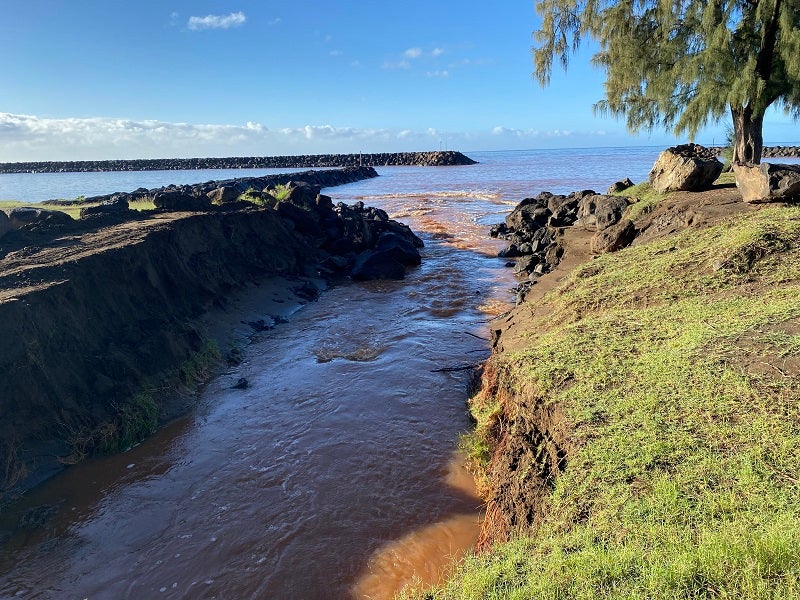Pollution at Kīkīaola Small Boat Harbor Violates Federal Clean Water Act, Judge Rules
Victory
—Citizens secure another win to clean up ocean pollution along West Kauaʻi
Contact
A federal judge ruled Tuesday that pollution from a network of drainage ditches that discharge into the Kīkīaola Small Boat Harbor violates the federal Clean Water Act. This is the latest in a series of victories that community groups have secured to protect important subsistence fishing grounds, surf breaks, and other recreational areas along West Kauaʻi from contamination that muddies the water, suffocates the reef, and risks the health of ocean users.
In a 2019 victory for community groups including Nā Ki‘ai Kai and Surfrider Foundation, the U.S. District Court for the District of Hawai‘i ruled that discharging pollution into the ocean from the Mānā Plain’s plantation-era drainage ditch system, including from the Kīkīaola Harbor Drain, requires a federal permit under the Clean Water Act, known as a National Pollutant Discharge Elimination System (“NPDES”) permit.
After the ruling, the County of Kauaʻi took over operation and management of the Kīkīaola Harbor Drain from the state Agribusiness Development Corporation. The community groups alerted the County to the court order and the need for an NPDES permit, and the County eventually applied for a permit. The Department of Health, which is responsible for the NPDES permitting program in Hawai‘i, refused to process the application and responded that no permit was required, contradicting the court’s 2019 order.
Na Ki‘ai Kai and Surfrider Foundation, represented by Earthjustice, returned to federal court last year, this time filing a lawsuit against both the County and the Department of Health for failing to abide by the court’s 2019 order. Later, the County agreed to not dispute that pollution from the Kīkīaola Harbor Drain violates the Clean Water Act unless regulated under an NPDES permit. But the Department of Health nevertheless refused to issue the required permit, allowing the pollution to continue without any monitoring or limits.
“This win proves that the Department of Health is not above the law and that this permit is the proper tool for reducing this water pollution,” said Earthjustice attorney Elena Bryant. “The Health Department can no longer ignore the pleas for help from West Kauaʻi residents who have suffered with a polluted shoreline for years.”
Community members catch fish and crab in Kīkīaola Harbor and also surf and swim in the surrounding areas.
“We hope the Department of Health gets the message now and starts taking the necessary steps to clean up ocean pollution along the Mānā Plain,” said Lawrence Kapuniai, a Kekaha resident and member of Nā Kia‘i Kai. His family has been fishing and gathering along the West Kauaʻi shoreline for generations. “We need clean ocean waters and healthy reefs so that we can continue to pass down our fishing traditions and feed our families.”
“Our reefs are being smothered by visibly filthy waters from the miles of ditches that empty into the ocean along the west side,” said James Nakahiki, a Kekaha resident and member of Nā Ki‘ai Kai. He descends from a family of fishers from West Kauaʻi. “The state and county need to figure out ways to minimize this pollution and protect West Kauaʻi residents.”
The Kīkīaola Harbor Drain discharges untreated drainage waters contaminated with sediment and other pollutants into the nearshore ocean waters at Kīkīaola Harbor during heavy rain events. The Department of Health has designated the nearshore waters around Kīkīaola Harbor as impaired for turbidity, which is caused by sediment. Water quality testing has detected elevated levels of turbidity, diesel, and enterococcus bacteria in the Kīkīaola Harbor Drain.
“Pollution from drainage ditches along the Mānā Plain is putting our health at risk,” said Dr. Carl Berg, Kauaʻi resident and Senior Scientist for Surfrider Foundation, Kauaʻi Chapter. “It’s time for the Department of Health to step up and regulate instead of continuing to fight us in court.”
“The ocean waters off West Kaua’i offer an amazingly valuable recreational resource to the local community,” said Angela Howe, Senior Legal Director for the Surfrider Foundation. “The decades-long hard work of the Surfrider Foundation Kaua’i Chapter to test the water and advocate for full water quality protection, alongside our partners at Earthjustice and Nā Ki‘ai Kai, has helped to protect this resource, and we are grateful for the continued litigation victories requiring Clean Water Act protection.”
The next phase of the lawsuit will determine how to address the County’s illegal discharges from the Kīkīaola Harbor Drain, such as with a court order requiring the Department of Health to promptly issue an NPDES permit. An NPDES permit to discharge into the nation’s waters is an important tool to reduce water pollution and includes limits on contamination levels as well as water testing requirements.

Additional Resources
About Earthjustice
Earthjustice is the premier nonprofit environmental law organization. We wield the power of law and the strength of partnership to protect people's health, to preserve magnificent places and wildlife, to advance clean energy, and to combat climate change. We are here because the earth needs a good lawyer.